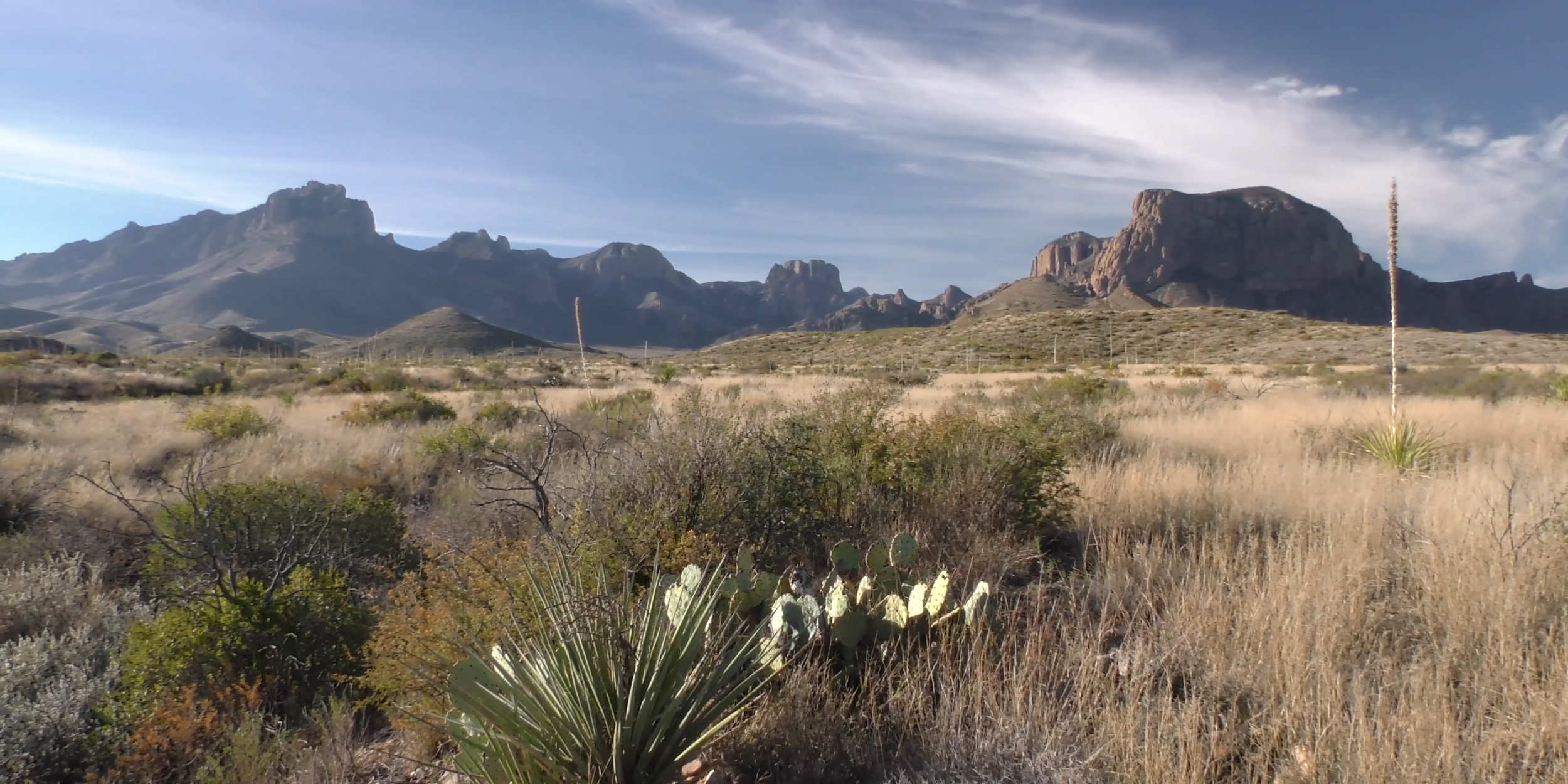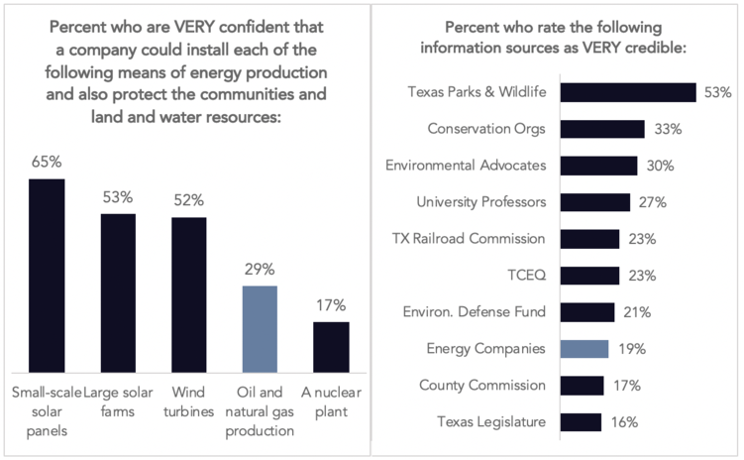
Development by Design in West Texas:
Mitigating Energy Sprawl Through Cooperative Landscape Planning
Kei Sochi, Jon Paul Pierre, Louis Harveson, Patricia Moody Harveson, David V. Iannelli,
John Karges, Billy Tarrant, Melinda Taylor, Michael H. Young and Joseph Kiesecker
May 2021
Public Opinion Research Findings
In the fall of 2017, the Cynthia and George Mitchell Foundation commissioned Hudson Pacific to conduct public opinion research on how energy development in the Greater Big Bend region is perceived by Texans statewide, with a particular focus on area residents’ opinions.
What we learned is meant to inform an approach to energy development in the region that better aligns the interests of residents, landowners, and their communities with energy developers and mineral rights holders.
We set out to answer two basic questions:
How much do Texans know about energy development taking place in the Trans-Pecos?
What do Texans think about it? Do they see it as an economic opportunity for their communities? Do they have concerns about impacts to their short- and long-term way of life?
Hudson Pacific explored these primary questions in two phases:
Phase One: residents in the region, who are the focus of this work; and
Phase Two: Texans statewide.
In the first phase, Hudson Pacific conducted a series of six focus groups with a diverse mix of residents from the communities of Alpine, Fort Davis, and Balmorhea/Pecos. In phase two, Hudson Pacific conducted a telephone survey (50% landline phones; 50% mobile phone), resulting in 1000 interviews with Texans statewide and an additional 200 interviews with Trans-Pecos residents.
Results – Phase 1
The Alpine Community: When it comes to awareness of energy development in the Trans-Pecos, proximity matters. The people of Alpine, who are removed from energy development in the Permian Basin, focused on the solar installations on the outskirts of town and the pipeline that was built in their community recently.
The Fort Davis Community: Fort Davis residents were somewhat more aware of actions related to the Alpine High discovery, although their attention was focused more on the oil and gas development to their northeast in the Midland-Odessa region.
The Balmorhea and Pecos Communities: The residents of Balmorhea and Pecos shared how they are experiencing the impacts of energy development right now. But even among those who are closest to it, awareness of the biggest find in the region, the Alpine High, continues to be non-existent more than two years later.
“You may not know Alpine High, but a lot of people know about the fracking that’s going on up in Balmorhea. There is a lot of talk about that, at least in the circles that I move in….”
Trans-Pecos General Comments
Generally, we found that residents of the Trans-Pecos are resigned to energy development in their area. As one participant put it, “you know you live in Texas, right?” They express frustration at a lack of reliable sources of information—they lament the loss of reliable local news sources—as well as not having a voice in the process, either directly or through their elected representatives.
We heard that energy companies had convened meetings in their towns to explain what was happening; however, they felt that key decisions had already been made. Leaders were neither listening nor asking for input on how development can coexist with communities. Instead, they were simply outlining what was already a “done deal.” And, while residents expect local leaders and elected officials to advocate for them and help coordinate development activities to limit impact on communities, they see most efforts as ineffective or having significant conflicts of interest.
“That’s definitely our city council and city managers. They’re not doing their job.”
“Now here’s the guy who said he’s leery of government getting involved, but I think the city fathers ought to be involved and ought to be speaking for us, and they ought to be listening to us when we talk to them about what—they’re our employees.“
“I think there’s so many conflicts of interest you can’t get anywhere. That’s what the problem has been from the beginning.”
Trans-Pecos Residents’ Perceptions
In terms of the perceived downsides, we heard the most concern about traffic. Although this may seem surprising, on average, one person is killed daily on the roads congested with heaviest energy-related traffic. For those in the Balmorhea/Pecos area, they say they experience the impacts in real time, whether it’s noise, structural damage to their homes, energy industry truck traffic on their roads, or shortages of and inflation in the price of every day goods such as gasoline and groceries.
People also express concern about development’s impact on natural resources—the water supply, Balmorhea pool, and the potential for water contamination. Environmental impacts also could deter tourism, which residents see as a critical part of their respective local economies.
“When I decided to move here…. One of the attractions and one of the things that I looked at was what’s the water source, ‘Oh, aquifer.’ There’s a college, ‘oh good.’ There’s a little emergency room/hospital, ‘oh good.’ What’s the population, and how long has the population been 6,000? A long time, and that’s a big attraction to me.”
“This is a tourist community, and guess what? Tourists aren’t going to want to come if they have to dodge trucks and pull over and wait…and it’s ugly…because it’s beautiful now. They come here because it’s beautiful and there’s stuff to do.”
“I gave the impression that I want to see growth, [but] I’m not saying, ‘Oh, let’s be our own Fort Stockton.’ No, not at all, but the town needs an income, and the income isn’t ranching anymore. It’s absolutely tourism. That is what’s going on here. Now, you start putting oil fracking and that kind of thing, that changes the whole flavor of Alpine.”
Residents of the Trans-Pecos are an independent bunch. They live there for a reason and, even in the face of potential impacts from energy development, they are loath to see government play a larger role in the area. That said, they have a pretty clear idea of what they would like to see.
Residents would like to see more thoughtful short- and long-term planning, and they would like to have a bigger, meaningful say in that planning—which begins with improved information about what is happening in the region.
“Yeah, it’s the city council. You can go to the meetings, but the city council, they really don’t listen, I don’t think.”
“Don’t just give people a voice to hear what they have to say; act on what they say and develop empathy for the local people and not just your bottom line because you’re a public corporation.”
Residents also said that planning should include making sure the area’s infrastructure is sufficient to meet the scale and scope of the planned development.
“The infrastructure is not holding up to what’s going on. You don’t have the civic leaders in place that you should that are one step ahead of the game.”
“It’s hypothetical and speculative, of course, but I think that if the people in the right place had been doing their due diligence then, hopefully, you would have had a less tremendous type of effect on the area.”
Residents also would like to see a standard implemented, “mitigation plus”—anticipating and preventing negative impacts and restoring lands to their original state.
“Maybe they could leave the place better than they found it. How about that idea?”
“I think they should at least restore what they damage and be absolutely culpable for it, for instance, roads or other things that they might on the way.”
Area residents are acutely aware that energy development is in motion, and they are resigned to fight it. However, they expect it to happen in a way that makes sense for the long-term health and benefit of their communities and their own quality of life.
In the focus groups we conducted in the first phase of our public opinion research we asked area residents if they knew what other Texans thought about the Trans-Pecos area of the greater Big Bend region of West Texas. Do Texans think about it at all? Do they care about it?
Most participants didn’t have an answer.
Results – Phase 2
To complement the Trans-Pecos focus groups, and to answer those and other questions, we conducted a statewide survey of 1,000 Texas registered voters plus two hundred interviews with people living in the Trans-Pecos region. We found that Texas voters think energy development is good for the state’s economy, but they have concerns about where and how it takes place.
Majorities think energy development is good for the state
Figure S1.
More than three-quarters of those who participated in the research said that energy development is good for Texas (Figure S1). Support for renewable energy development was especially high—more than 6 in 10 said wind and solar development would be “very good” for Texas. Another quarter said it would be “somewhat good.”
While not surprising, there are significant partisan differences in the type of energy development Texans support. Republicans are somewhat more likely to favor oil and gas development, while Democrats overwhelmingly prefer wind and solar energy development. When asked why they thought development is good for the state, nearly all survey participants, regardless of party, pointed to job creation or support for the Texas economy.
But even though Texans support energy development, they don’t want it to take place just anywhere
Figure S2.
When asked to choose, most Texans prioritized protecting communities and land and water resources for future generations (56 percent) over energy development (Figure S2). Less than a third (30 percent) said they think the benefits of energy development outweigh those protections.
Reflecting this view, more than half (52 percent) of those who participated in the survey opposed oil and gas exploration and production in their own local communities. Even more opposed development in some of the unique sites in the Trans-Pecos region, such as Big Bend National Park (70 percent were opposed), the Davis Mountains and the McDonald Observatory (63 percent) and the San Solomon springs at Balmorhea (54 percent).
As we discussed earlier, this is an area where energy development is starting to evolve.
Even most Republicans, who tend to be more supportive of energy development, agreed we should “protect communities and land and water resources in Far West Texas even if it means limiting energy production there.”
Note that survey respondents weren’t opposed to energy development everywhere. They were supportive of it happening in places such as the Gulf of Mexico (57 percent) and the Texas Coastline (50 percent).
There is some skepticism that oil and gas can be produced without harming communities and resources
Some of the concern about protecting “special” places may be due to the fact that few Texans have complete confidence that oil and natural gas can be developed with minimal impact (Figure S3). The energy companies who would be doing the work are not seen as especially credible either.
Figure S3.
What do Texans want when it comes to energy development?
Figure S4.
Regardless of the issue we’re talking about, there is no doubt that people want their voices to be heard. The data showed that Texans overwhelmingly think their fellow residents should have a greater say about what happens in their communities (Figure S4).
When it comes to specific policy changes, Texans favored a wide variety of proposals. They weren’t always as convinced that the ideas would be effective at making sure energy development reflects the needs and priorities of local communities, but a couple of items stood out as both popular and effective:
Increasing reporting requirements when it comes to water contamination. This reflects the concerns about water issues that arose spontaneously in our focus groups.
Restoring land to its original state.





